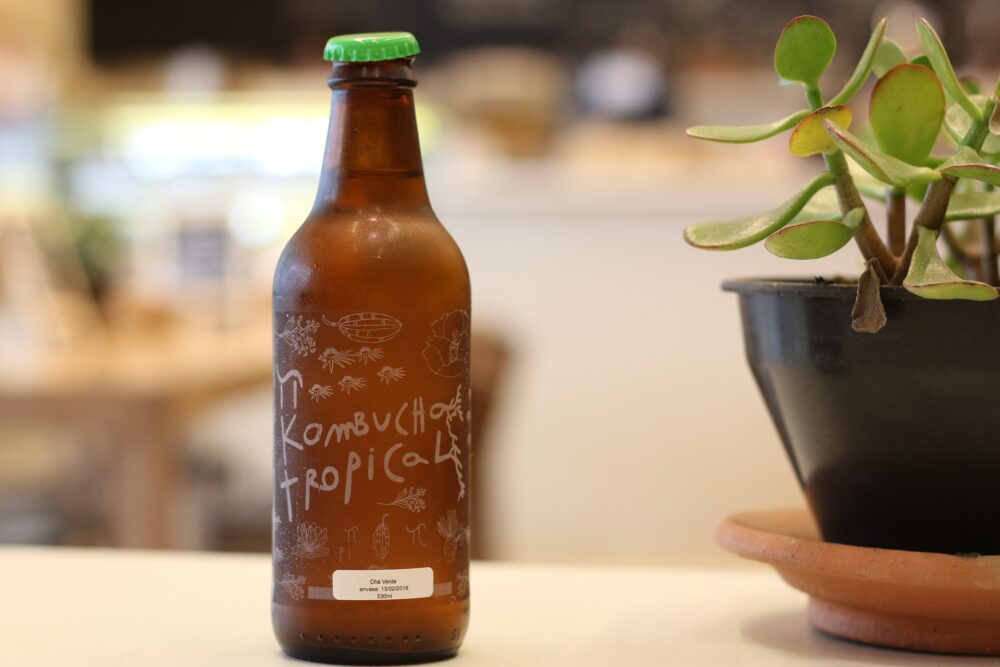It sits in a perfectly organized row within many supermarkets today: kombucha, the world’s golden health drink. Its bright, aesthetic labels pull in consumers, but the promises of amazing benefits keeps them hooked. These claims may explain the drink’s ubiquity in the modern day—from being on tap at startup companies to bottled in the refrigerators of millennials, kombucha is everywhere.
Kombucha is a fizzy fermented tea that has dominated the health food world for years. It’s believed to have been derived from ancient Chinese medicine and is made from a mixture of green or black tea, sugar, and a Symbiotic Colony Of Bacteria and Yeast (SCOBY). SCOBY is used in the production of a variety of other foods and drinks, such as sourdough bread and ginger beer. Kombucha is claimed to have a wide range of benefits, which include reduced risk of diabetes, blood pressure, and heart disease.
The fermentation of sweetened brewed tea by SCOBY not only causes kombucha to taste slightly alcoholic, but is also the heart of its claimed health benefits.
The fermentation of sweetened brewed tea by SCOBY not only causes kombucha to taste slightly alcoholic, but is also the heart of its claimed health benefits. As the fermentation process occurs, vitamin B, antioxidants, and probiotics are produced. Experts believe that the probiotic portion of the drink is what allows it to be beneficial to human gut health; this bacterial quality can improve body processes such as digestion and metabolism.
To what extent is there actual scientific evidence to back up these health claims? Tea itself has natural antioxidants, suggesting anti-inflammatory and anti-microbial benefits when ingested. However, there are surprisingly no conclusive studies that can confidently back any of the special health benefits kombucha claims to have outside of normal tea. For starters, the bacteria present in kombucha are still only believed to be probiotic, therefore the health claims associated with the human gut are yet to be confirmed. In addition, most clinical studies that have examined the effects of kombucha have been either animal or in vitro studies, not direct trials on human patients. While one study did investigate a direct relationship between kombucha and human health in non-insulin dependent diabetics, the research did not have proper controls or randomization. As it stands today, most of the drink’s bold claims are still only mere speculation.
There are surprisingly no conclusive studies that can confidently back any of the special health benefits kombucha claims to have outside of normal tea.
Aside from its unconfirmed benefits, kombucha may even have potential harmful effects due to its low pH. Clarisa Gastelum, a professor at Stony Brook School of Dental Medicine, believes that the acidity of kombucha can be comparable to soda—both drinks can be problematic for an individual’s teeth. Higher acidity can affect the durability of tooth enamel and increase discoloration, leading researchers to recommend drinking these beverages out of a straw.
What all of this means isn’t that kombucha is necessarily bad for you, but that it may not be as magical as some believe it to be. There still exists the possibility that the beverage truly does have all the perks that it claims, such as aiding digestion, diabetes, and even cancer. However, it’s also critical to recognize that none of this has been scientifically proven just yet when purchasing the trendy drink. As for the future of kombucha, retailers are hopeful that, even if it may not be confirmed to have those additional health benefits, it can still be used as a replacement for high sugar soda. Additionally, kombucha has been starting to be produced in combination with cannabidiol, otherwise known as CBD, from the cannabis plant for pain management purposes. It’s clear that, regardless of the amount of concrete research, kombucha is going to stay in supermarkets for a while.
Image source: Pixabay

